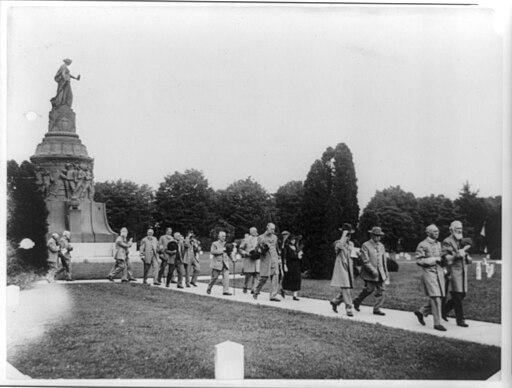“A Confederate memorial is to be removed from Arlington National Cemetery in northern Virginia in the coming days,” the Associated Press reports, as “part of the push to remove symbols that commemorate the Confederacy from military-related facilities.”
For years, I’ve been of two minds about the movement to remove these memorials.
On one hand, I generally object to the idea of “government property” being used for such purposes. In fact, I object to the very idea of “government property,” but if there’s going to be such a property claim I want its allowable uses and purposes to a least be very narrowly defined. So yeah, take down the memorials — all of them, not just the Confederate ones.
On the other hand, I’m a fan of history, and the memorials in question illustrate the history of (and the history following) America’s single greatest and most violent convulsion, a “Civil War” resulting in several hundred thousand deaths.
Arlington National Cemetery is part of that history. It’s situated on land confiscated from Confederate general Robert E. Lee, and several hundred Confederates lie among the Civil War dead buried there.
While the 1914 monument erected to those Confederates bears certain features the present generation may find offensive (e.g. a slave following his “owner” to war), it also bears the inscription “they have beat their swords into plough-shares and their spears into pruning hooks.” It is, in fact, a monument to reunification, not division, and to peace, not war. What’s not to like about that?
What was the Union premise for the war? That the United States was “one nation, indivisible.”
If that premise is correct (I don’t believe it is, but IF), then the Confederate dead are American dead, and precisely as entitled to American honors and memorials as the Union dead.
During the Mexican War, later Union general and US president Ulysses S. Grant wrote to his fiancee: “If we have to fight, I would like to do it all at once and then make friends.”
The post-war era didn’t really accomplish that. After “Reconstruction,” the south largely recreated the former slave system in all but name, leaving its demolition to the civil rights movement of a century later, and to this very day, southern “Lost Cause” revisionists and revanchists keep the flames of Confederate sympathies burning.
But the Union, not the Confederacy, won that war — a war it fought on and for the premise of a single America including the former Confederacy and former Confederates.
Desecrating the graves of the Confederate dead, denying them commemoration on land seized from their most esteemed commander, sends exactly the opposite message. It’s an attempt to preserve, not end, the divisions the war was all about.
Thomas L. Knapp (Twitter: @thomaslknapp) is director and senior news analyst at the William Lloyd Garrison Center for Libertarian Advocacy Journalism (thegarrisoncenter.org). He lives and works in north central Florida.
PUBLICATION/CITATION HISTORY

